True gardeners know that their spaces are never really finished. They are in a constant state of flux. Plants sometimes grow larger than the nursery tags lead us to believe, voles devastate a beautiful bed of hostas, an heirloom Japanese maple falls prey to an unpredicted late-season frost and so on.
Another scenario, if we are being honest with ourselves, is that our tastes simply change; our gardens become stagnant and in need of an update. If this describes your garden, consider moving slightly outside your comfort zone by adding an artistic edge. Embrace a bit of the industrial.
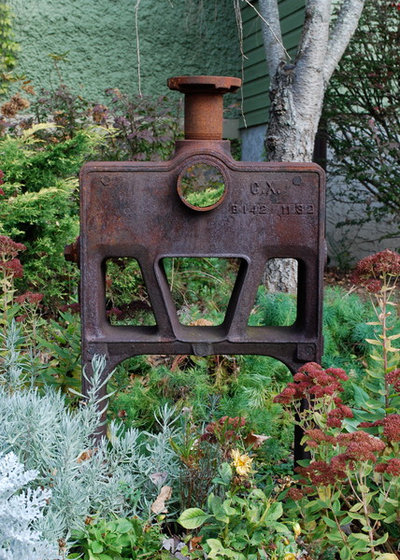
Jay Sifford Garden Design
What is it? Industrial style has roots in the advent of machinery and factories in the late 1800s. The raw, pared-down beauty of salvaged metal pieces speaks to the relationship between form and function. It reminds us of history and the simple beauty of everyday objects we normally take for granted.
Why it works in a garden. Industrial pieces bring an element of the unexpected to a garden. They work from a design standpoint based on the concept of juxtaposition. Consider these four characteristics: size, shape, color and texture. When placing an industrial element in a garden vignette, match it to a plant, boulder or hardscape based on one or two of these four characteristics. By doing so you will form a relationship between the piece and your space but still have enough contrast.
The salvaged metal piece shown in this photo works in this garden because the rust relates to the dried flower heads with regard to color and texture. The shape and size of the piece cause it to stand out and make an interesting yet appropriate statement. Let’s look at some other examples and why they work.
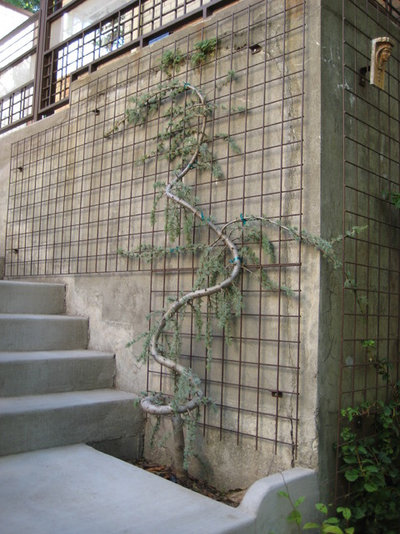
TERRABELLA, inc.
Newly fabricated metal. Industrial accents need not all be antiques, nor do they need to be stand-alone pieces of art. Here we see sections of rusted agricultural hog wire repurposed as a trellis for a serpentine
Blue Atlas Cedar (
Cedrus atlantica ‘Glauca’, zones 6 to 9).
The grid pattern speaks to the geometry of the steps and to the terrace railing above. The wire rust mimics the color of the railing, providing continuity between levels. The serpentine shape of the cedar breaks the geometry of the space, adding softness and artistic interest. Additionally, the silver color of the cedar’s trunk repeats the color of the concrete.
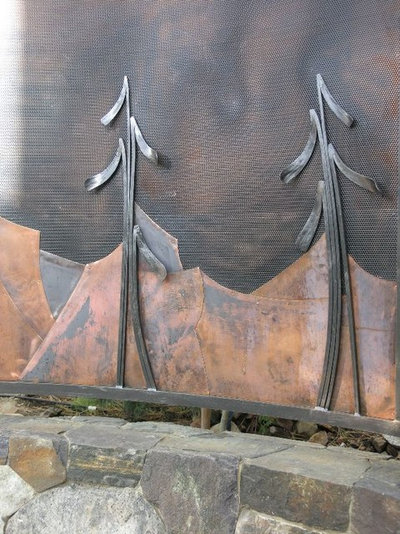
Derviss Design
Mixed metals. This fabricated screen provides a perfect backdrop for a stone seating area in a rustic garden. Combining mesh and solid sections creates additional interest and an enclosed vibe without limiting light and air movement.
The design of this piece relates to the garden’s rustic style and location. The colors and textures of the various metals complement those of the rock work, giving this vignette of combined hardscape materials a homogenous feel.
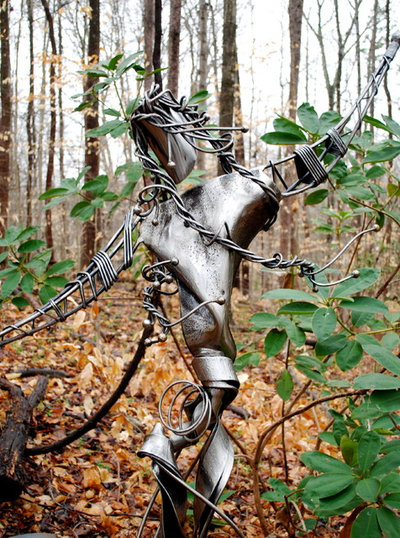
Jay Sifford Garden Design
Metal sculpture. Tired of cast concrete rabbits peeking out from behind your rhododendrons? Consider a piece of metal sculpture to create unusual interest and drama. Many metal artists will work with you to create a one-of-a-kind piece.
This piece, by metal artist Benjamin Parrish, works on several levels. The strands of hair mimic the nearby twisted grapevines. The implied movement of hair blowing in the wind lends an additional layer of interest. Finally, on sunny days the bright metal reflects precious light in this shaded woodland garden. On cloudy days it mimics the overcast sky.
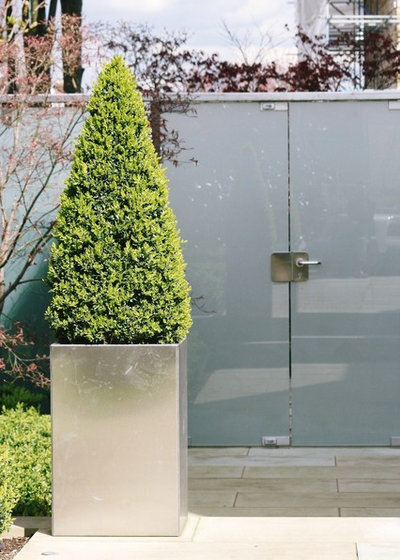
Laara Copley-Smith Garden & Landscape Design
Glass. Not all industrial elements need to be fashioned of metal. Frosted-glass garden walls and doors provide a clean, crisp feel to the outdoor space here.
The reflective glass both captures ambient light and mimics the reflectiveness and color of the metal planter. All of this provides a stage for the traditionally pruned evergreen, creating a contrast that really works. This vignette emphasizes shapes and does so with style.
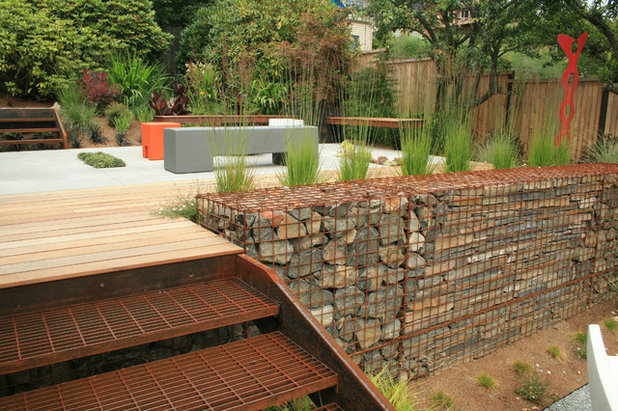
Banyon Tree Design Studio
Gabion walls. Gabions, which are fabricated metal cages filled with rocks or even chunks of colored recycled glass, combine materials in new and interesting ways. Consult a design professional if you are considering such a wall, as proper welding and weight loads are of primary importance.
This garden is a study in juxtaposition. The metal cage and rocks of the gabion are in high contrast, adding drama. The cage speaks to the fabricated steps in color and texture, as well as to the terrace furniture in shape. The color of the gabion rocks is also repeated in the furniture.
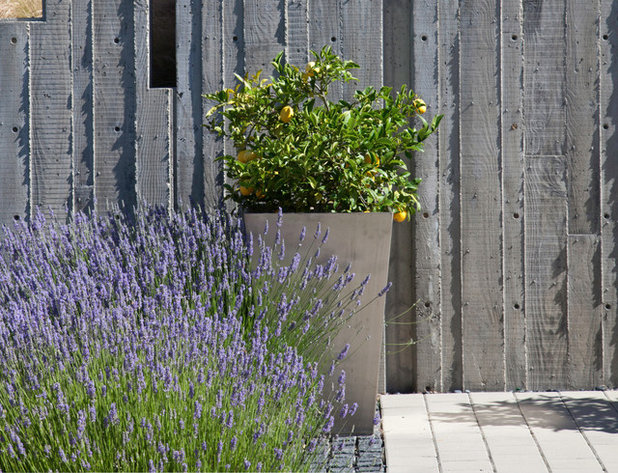
WA Design Architects
Board-formed-concrete walls. There is nothing more industrial than concrete. For walls like the ones shown here, timber-built forms are created and filled with concrete. After the concrete partially cures, the forms are removed, leaving unique patterns on the walls. As with the gabion walls, consult a professional for installation.
This wall exhibits high contrast because of the industrial feel of the concrete and the unique, organic pattern of the wooden forms. It is a marriage that is appropriate in woodland gardens as well as urban enclaves.
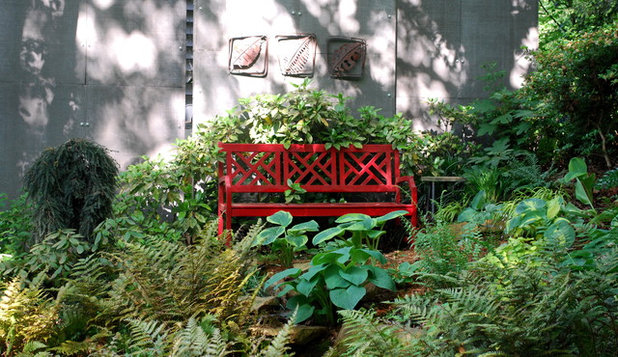
Jay Sifford Garden Design
Concrete fiberboard. This underused material, also known as backer board, is manufactured for use as a substrate for tile floors and shower enclosures. It consists of concrete, fiberglass mesh for reinforcement and Styrofoam for weight reduction. Several types of concrete board are available. Be sure to pick one that does not contain paper.
Its low price, light weight and availability make concrete board a contender for a variety of outdoor applications. It can be cut with a circular saw that’s been fitted with a diamond blade. Be advised that the application of a good concrete sealer will increase its longevity outdoors.
Concrete board is useful for building privacy screens and small non-load-bearing walls. A simple frame of outdoor-grade lumber can be clad with this material, creating a unique and beautiful garden structure. The texture and color striations of concrete board mimic granite cliffs in the application shown here.
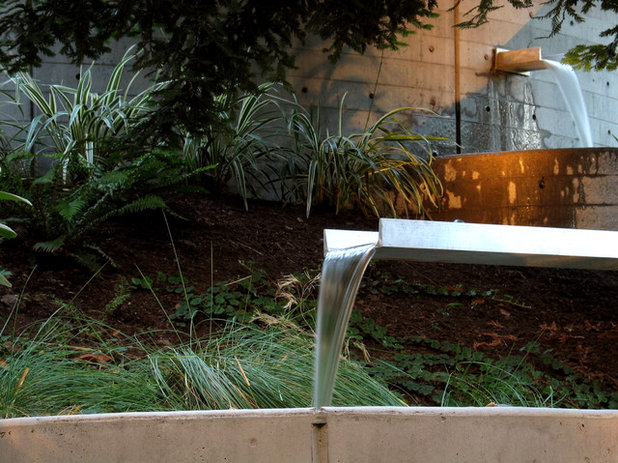
Lazar Landscape Design and Construction
An edgy water feature. There is something to be said for the tranquil beauty a natural-looking waterfall adds to a woodland garden. Perhaps, however, you live in an urban environment or just want something unique. Consider a trough (spillway) installation, such as the one shown here, made of metal or perhaps even thick cast glass.
This water feature provides the relaxing sound of falling water that we all enjoy, but does so in a very contemporary, industrial way.
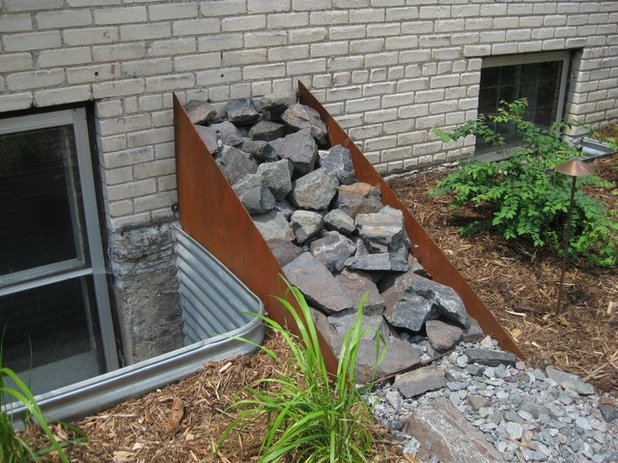
Spark Hut - Metal Art Design Build
Upgrade the necessities. My current mantra is this: Why be ordinary when you can just as easily be unique and spectacular? Consider this custom water diverter. Every dwelling needs an efficient way of moving water away from its foundation. This one is a real eye catcher compared to the rectangular blocks of concrete or plastic most people have.
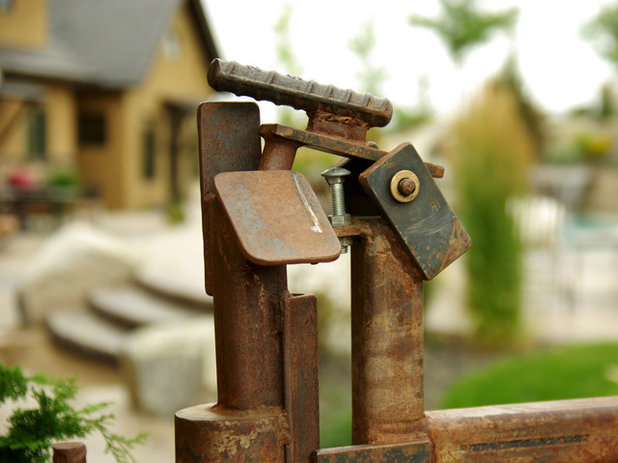
Land Expressions LLC
Don’t forget the details. It is frequently said that both the beauty and the devil are found in the details. Why use a standard gate hinge from a big-box store when you could use a custom piece such as the one shown here? Hinges, oversize lag bolts and door handles are all fair game in the quest to create a truly beautiful and unique garden.
See more ways to get industrial style at home





